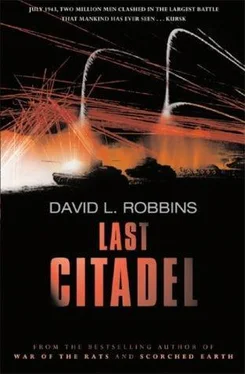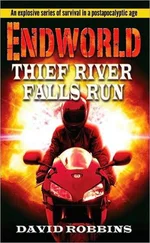He searched for half an hour – the hospital buzzed, a hive of moaning – until a harried nurse led him to Thoma. The man lay in his tailored black SS uniform, on a sheetless bed in a corner of what once was the cafeteria. There were no food smells here, just the clean odor of gauze and the brown smells of soldiers and the dirt they’d fought in. Thoma lay with his hands arranged beside his hips, composed. A collar of bandage swathed his neck, marred only by a red coin of blood below the ear. Thoma was dead.
Luis stood beside the bed.
‘Sniper.’ A grenadier in another cot sat up, his leg was wrapped in a log of gauze. A sniper got him. I heard him say it. A little while ago.’
Luis did not acknowledge the soldier except to pivot his head to the man, then turn away, back to Thoma. Yes, that would be Erich. He would be standing in the turret during the attack, bravado, charmed. Luis lay his hand over the still fingers. Thoma had gone whiter than Luis. He was no longer the man Luis might have become; they’d switched roles. Thoma was now the pale thing.
That’s why Thoma sent word for Luis to come. To make the exchange, to give his blessing.
Luis lifted his hand from cool Thoma. The Iron Cross at Thoma’s throat was not covered by the bandage. The soldier in the other bed had continued jabbering, about the combat, about Thoma perhaps and his exploits, that he might have been a hero. Luis walked off, past the yapping soldier’s bed without exchanging another look. The man gabbled as Luis cut past.
He left the hospital, purposefully. The faster he walked, the more he gained the sense of shedding the failures of the wounded there, the boundaries of the dead, he was alive and hungry and hailing a car. One stopped for him and he got in the back seat, slamming the door with a sound that only the halest of men can make. He rode through frightened Belgorod. The scales of the battle were not tipped just yet, there was still time for Luis Ruiz de Vega to add his weight. Yes, he thought, my weight.
He entered the situation room. The morning was an hour older and nothing had changed, there were no bodies scattered about the carpet, just wooden blocks prodded back or forth. They ought to move this map to the hospital, Luis thought, that’s what Grimm and Breit should have as their backdrop. He walked to Colonel Breit.
‘Sir.’
‘Yes, Captain. Refreshed, I hope.’ The officer’s voice was bland, without sentiment. He’s draining, Luis realized. In a day or two he’ll be as white as Thoma.
‘Sir, Captain Erich Thoma is dead.’
Breit reacted with a bland face. He nodded and reached for his cigarette pack. Major Grimm muttered a curse and set both palms flat on the board to resume his gaze at the pieces. Thoma was nowhere in this room, he was off the board, and the board was all that mattered. Luis reproached himself for tolerating this for the four days he already had.
‘Sir.’
Breit had turned from Luis, expecting the captain to go collect his dispatches and get about his work, stoking the map.
‘Sir.’
‘Yes, Captain?’
‘I request permission to take over Captain Thoma’s command.’
Breit kept his eyes fixed on Luis for several moments, long enough to tug a cigarette from the little carton, pulling his eyes away only to match his lighter flame to the tip. He sucked deep lungs of smoke, eyes on Luis, then peered through the gray, long exhale. The partisan’s heart pulsed in Luis’s hand. He wanted to hold it out to Breit, have him feel the beat for himself. He’d know then.
On the far side of the map, Major Grimm said nothing. He was a protruding and indulgent man, Luis did not want him to speak, not even on his behalf. Breit was a colonel in the SS. Luis stood in front of this officer wearing the same black uniform, the one Thoma wore, the one worn by the only men defeating the Russians on that map.
Breit spoke.
‘How long since you’ve been in combat, Captain?’
Look at me, Luis wanted to shout. I’m in combat every fucking day Instead, he kept the gush of temper out of his face and voice.
‘Almost a year, sir. Before that, I had five years’ service in the armored divisions of Generalissimo Franco and Adolf Hitler.’
Breit dragged again on the cigarette. The corners of the colonel’s mouth flicked. ‘What do you know about the Tiger tank?’
‘I know, sir, that if we win this battle, it will not be because of German weapons but because of the hands they’ve been put into. And I know that we need to reach Kursk as soon as possible.’
‘Yes,’ Breit said, billowing smoke with the words, ‘the Americans are coming.’
‘Yes, sir. The Americans.’
Breit glanced back at Grimm, who echoed his nod.
‘ La Daga , hmmm?’
The name of the pickpocket, and the banderillero , and the tank commander. A hero’s name.
‘Go,’ Breit said.
July 8
0710 hours
the Oboyan road
Luis rode alone in the bed of a troop carrier on the Oboyan road. He’d hitched a ride in a convoy headed to Luchki to deliver fuel to Leibstandarte and fetch back the wounded. The road itself had weathered the battle well, it was not too torn up by tracked vehicles or bombs. But the land east and west of the highway had been scourged into a vista of destruction. There was hardly anywhere Luis could look that did not display man’s ability to blacken.
Luchki lay fifty kilometers north of Belgorod. In the two hours he spent bouncing on a bench in the back of the four-ton truck, Luis saw a thousand charred vehicles: tanks, self-propelled artillery, personnel carriers, supply trucks like the one he rode in now, ambulances – there was no preference of army, both iron crosses and red stars alike blistered on their burned aprons. The ground had been torn up by mine blasts and cannons, creviced with abandoned trench works, and charred under the gusts of flamethrowers. Unattached wheels and spent shell casings were common on the ground, so were the dead, every human or mechanical bit of them seared murky by the heat of the fighting. The battlegrounds bumped past and Luis was surprised at how the natural colors and contours of the earth had been sooted over, as though the black German blocks of the big map were actually here pressing their shade into the world. He rode amazed at how even the immense steppe sky could absorb so much of man’s stain that it lost its own blue; it was blotched by the streaks of fighters and bombers, smoke from ruined villages and smoldering fields, flak burst in its deepest reaches. He recalled Breit’s cigarette cloud over the map and thought, Yes, that’s here, too. Calm hovered here in the aftermath of the fighting, but it was uglier than any battle, a scorched peace. Luis held on to the truck’s panels, eager to rejoin his division, where the battle took place and everything was not already settled.
In Luchki, he dismounted the truck. The Soviet farming commune was unrecognizable as having ever held the roofs and beds of people. It was a junkyard now, a vignette of the power that frothed when the two battling armies met on the field. Three silos lay on their sides, crumpled, riddled tubes. Fences and sheds, porches and painted windowsIIIs, were strewn flat in a jumble and crushed, nothing of the village stood higher than a hitching post. Luis smelled the battle perfume of petrol and gunsmoke splashed over the smashed slats that had been homes and barns.
Luchki was in the rear of Leibstandarte , in the shaft of the salient thrust like a pike into the Russian defenses by the SS divisions. The front lines were only eight kilometers away on three sides, surrounding all but the south where Luis had come from. Rumbles stomped back to Luchki from these fronts but the early morning had not yet erupted. Luchki filled with supplies of fuel and medicine for Leibstandarte . A battlefield armor repair station was set up next to an aid tent. Luis made himself known to a passing lieutenant. The subaltern directed Luis to the repair area.
Читать дальше












